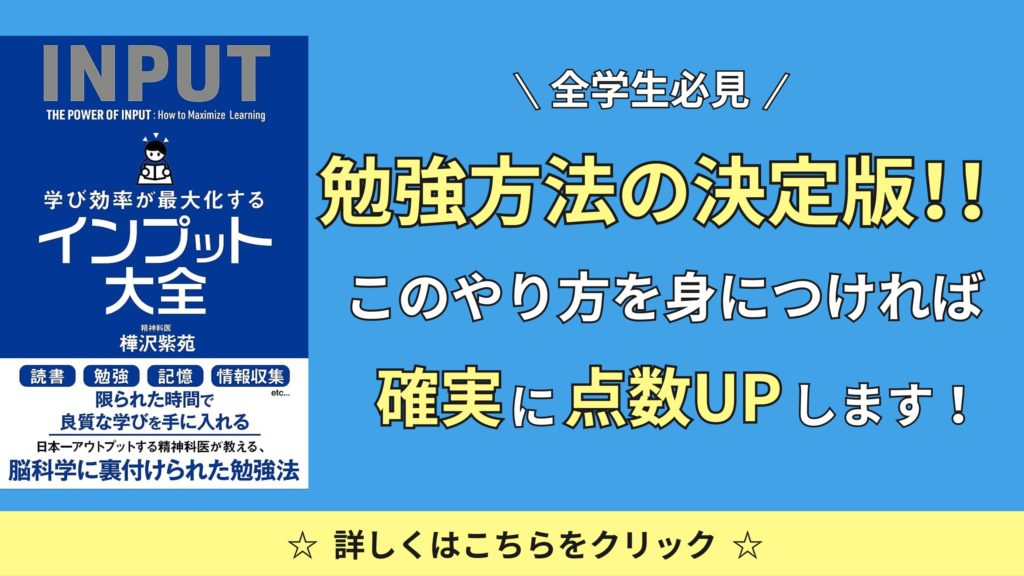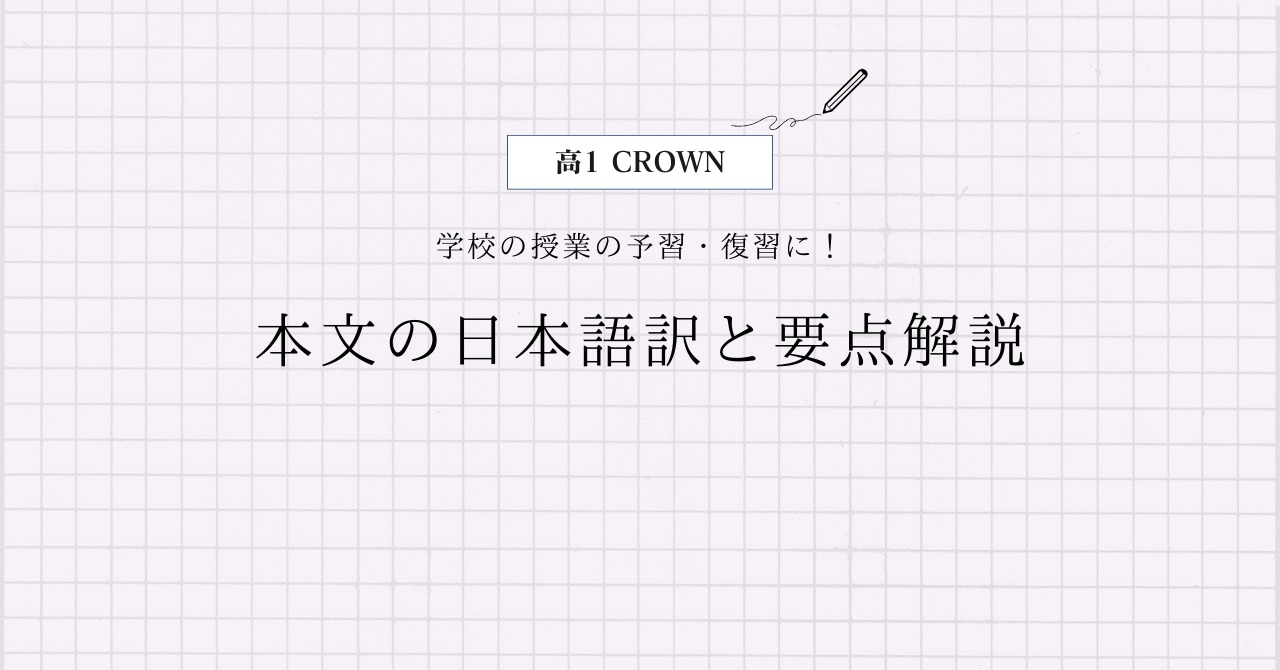三省堂 高1CROWN English Communication1 Lesson6 Section3の本文の日本語訳と重要箇所の解説です。
Section6-1, 6-2, 6-4の解説はこちらからご覧ください。
>高1CROWN English Communication1 Lesson6 Section1 本文和訳
>高1CROWN English Communication1 Lesson6 Section2 本文和訳
>高1CROWN English Communication1 Lesson6 Section4 本文和訳
- CROWN English Communication1 Lesson6 Section3 本文と日本語訳
- CROWN English Communication1 Lesson6 Section3 重要事項の解説
- Smartphones have made our lives richer and more pleasant.
- However, many researchers report on the negative effects of the use of smartphones.
- Using smartphones to entertain very young children may negatively affect their development.
- For full mental and physical development, children need contact with other people and the real world.
- It’s not only the problem of child development.
- Teenagers and adults also face risks.
- Smartphones may distract us.
- They are always ringing and buzzing to make us pay attention to them.
- In fact, they may distract us even when they’re on silent mode.
- In one study, 800 people were asked to solve math problems.
- (1) those who left their smartphones in another room;
- and (3) those who kept their smartphones right in front of them.
- The results: Group 1 did the best; Group 2 came next; Group 3 did the worst.
- Smartphones had an effect on how well people were able to focus their attention.
- CROWN English Communication1 Lesson6 Section3 まとめ
CROWN English Communication1 Lesson6 Section3 本文と日本語訳
Smartphones have made our lives richer and more pleasant.
「スマートフォンによって,私たちの生活はより豊かに,より楽しくなりました。」
However, many researchers report on the negative effects of the use of smartphones.
「しかし,多くの研究者はスマートフォンの使用による悪影響について報告しています。」
Using smartphones to entertain very young children may negatively affect their development.
「幼児を楽しませるためにスマートフォンを使うことは子どもの発達に悪影響を与えるかもしれません。」
For full mental and physical development, children need contact with other people and the real world.
「十分な精神と身体の発達のために,子どもたちは他者や現実世界との交流が必要です。」
It’s not only the problem of child development.
「それは子どもの発達だけの問題ではありません。」
Teenagers and adults also face risks.
「10代の若者たちと大人も危機に直面しています。」
Smartphones may distract us.
「スマートフォンは私たちの気を散らすことがあります。」
They are always ringing and buzzing to make us pay attention to them.
「私たちがスマートフォンに注意を向けるように,スマートフォンは常に鳴っていたり,ブーブーと音を立てています。」
In fact, they may distract us even when they’re on silent mode.
「実際,スマートフォンがサイレントモードのときでさえも私たちの気を散らすおそれがあります。」
In one study, 800 people were asked to solve math problems.
「ある研究で,800人の人が数学の問題を解くように頼まれました。」
They were in three groups:
「彼らは3つのグループに分けられました。」
(1) those who left their smartphones in another room;
「(1)自分のスマートフォンを別室に置いてきた人たち」
(2) those who had their smartphones in their pockets;
「(2)自分のスマートフォンをポケットに入れていた人たち」
and (3) those who kept their smartphones right in front of them.
「(3)自分のスマートフォンを自分の目の前に置いていた人たち」
The results: Group 1 did the best; Group 2 came next; Group 3 did the worst.
「結果:グループ1が最も良く,グループ2が次に良く,グループ3が最も悪かったです。」
Smartphones had an effect on how well people were able to focus their attention.
「スマートフォンは,人々がどれくらいよく意識を集中させることができるかということに影響を及ぼしました。」

CROWN English Communication1 Lesson6 Section3 重要事項の解説
Smartphones have made our lives richer and more pleasant.
ここでは「現在完了」が使われていますね。
“make”は「使役動詞」で,“make 名詞 動詞の原形”で「名詞に~させる」という重要表現です。
今回のように主語が「もの」のときは,「ものによって~する」といった形で訳すと綺麗な日本語になりやすいですよ。
“rich”は「豊かな」,“pleasant”は「楽しい,愉快な」という形容詞で,どちらも「比較級」になっていますね。
“lives“は“life(生活,人生)“の複数形で,語尾が”f,fe”で終わる名詞を複数形にするときは”f,fe”を取って”ves”をつけます。
knife→knives(ナイフ), leaf→leaves(葉)などがあります。
However, many researchers report on the negative effects of the use of smartphones.
“however”は「しかし」という意味の副詞になります。
同じ意味で“but”がありますが,こちらは接続詞なので品詞が異なります。“but”は“文A,but 文B”というように,2つの文を繋ぐ際に使います。
“文A. But 文B.”というように,“but”を文の先頭に置いて1文だけで完結させるのは原則NGとなります。
“researcher”は「研究者,調査者」,“effect”は「影響,効果」,“use”は「使用」という名詞です。
“report”は「報告する」という動詞で,“report on~”で「~について報告する」となります。
“negative”は「否定的な,悪い」といった形容詞ですね。
“of”は前置詞で,”A of B”の形で「BのA」というように後ろから前に訳します。
Using smartphones to entertain very young children may negatively affect their development.
“using”は「動名詞」になっていますね。
“entertain”は「を楽しませる」という動詞で,ここでは「不定詞の副詞的用法」になります。
“very young children”は「幼児」,“development”は「発達,発展,開発」という名詞で,“their”は“very young children”を指しています。
“may”は「~かもしれない」という可能性を示す助動詞で,“negatively”は「否定的に,反対に」といった副詞,“affect”は「に影響を与える」という動詞です。
“negatively affect~”で「に悪影響を与える」となります。
For full mental and physical development, children need contact with other people and the real world.
“full”は「いっぱいの,十分な」,“mental”は「心の,精神的な」,“physical”は「身体的な,物理的な」という形容詞になります。
“need”は「を必要とする」という動詞で,“contact”は「接触,交流」という名詞ですね。
“other”は「他の」,“real”は「現実の,本当の」という形容詞です。
It’s not only the problem of child development.
“It”は“Using smartphones”を指しています。
“only”は「~だけ,たった~」といった強調を示す副詞ですね。
“problem”は「問題」という名詞です。
Teenagers and adults also face risks.
“teenager”は「10代の若者」,“adult”は「大人」,“risk”は「危険,危機」という名詞です。
“also”は「また,さらに」といった副詞で,付け加える役割があります。色々な文で使うので必ず覚えましょう!
“face”は「に直面する」という動詞になります。
Smartphones may distract us.
“distract”は「(人の)気を散らす」という動詞になります。
They are always ringing and buzzing to make us pay attention to them.
“They”と“them”は“Smartphones”を指しています。“always”は「いつも,常に」という頻度を表す副詞です。
“ring”は「鳴る」,“buzz”は「(ハチ・機械などが)ブーンと音を立てる」という動詞で,どちらも「現在進行形」になっていますね。
この“make”は「使役動詞」で,“pay attention to~”は「~に注意を払う」という重要表現です。
そして“to make”は「不定詞の副詞的用法」になっていますね。
In fact, they may distract us even when they’re on silent mode.
“in fact”は「実際に」という重要表現です。“they”は“Smartphones”を指しています。
“even when~”は「~ときでさえ」という「接続詞」になります。
“silent mode”はそのまま「サイレントモード」でOKです。
In one study, 800 people were asked to solve math problems.
“one”は「ある」と訳します。“study”は「研究」という名詞ですね。
“ask 人 to 動詞の原形”は「人に~するよう頼む」という重要表現で,今回は「受動態」になっています。
“solve”は「を解決する」という動詞です。
(1) those who left their smartphones in another room;
“those who 動詞~”は「~する人々」という表現になります。“who”は「主格の関係代名詞」です。
“left”は“leave(を離れる,置いていく)”の過去形ですね。
“another”は“an + other”が一語になったもので,「もう1つの,もう1人の」という意味の形容詞です。“other”が複数を指すのに対し,”another”は単数を指します。
and (3) those who kept their smartphones right in front of them.
“kept”は“keep(を保つ,保持する)”の過去形ですね。
“right”は「ちょうど」という副詞で,“in front of~”は「~の前に」という重要表現になります。
“them”は“those”を指しています。
The results: Group 1 did the best; Group 2 came next; Group 3 did the worst.
“result”は「結果」という名詞です。
“best”は副詞“well”の,“worst”は副詞“badly(下手に,悪く)”の「最上級」になります。
Smartphones had an effect on how well people were able to focus their attention.
“have an effect on~”で「~に影響を及ぼす」という意味です。
“how well”は「どれくらい上手に・よく」といった疑問詞で,ここでは「間接疑問文」になっていますね。
“be able to 動詞の原形”は「~することができる」という助動詞“can”と同じ意味で,“focus”は「注目する,焦点を合わせる」といった動詞です。
“focus one’s attention”で「意識を集中させる」といった意味になります。

CROWN English Communication1 Lesson6 Section3 まとめ
以上がCROWN English Communication1 Lesson6 Section3の日本語訳となります。
「使役動詞」「関係詞」などの使い方をしっかり確認しておきましょう!
>高1CROWN English Communication1 Lesson6 Section1 本文和訳
>高1CROWN English Communication1 Lesson6 Section2 本文和訳
>高1CROWN English Communication1 Lesson6 Section4 本文和訳
何か分からない点や他に解説してほしい点があれば,お気軽にコメントしてください!




コメント